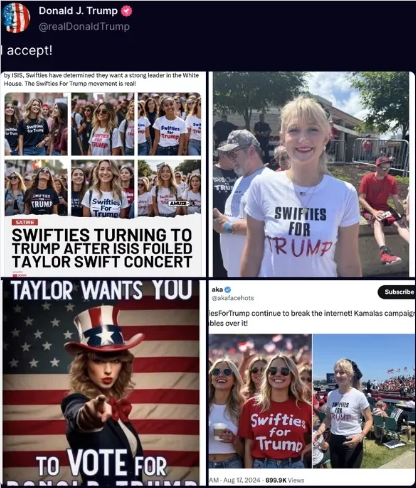Recently, former U.S. President Donald Trump shared a series of images on social media, which appeared to show Taylor Swift and her fans supporting his presidential campaign. Trump accepted this apparent endorsement with a caption, "I accept." The images featured young women wearing T-shirts emblazoned with "Swifties for Trump," and in one picture, Taylor Swift was depicted as Uncle Sam, alongside a slogan that read, "Taylor wants you to vote for Donald Trump."

However, these images quickly faced skepticism and backlash from Taylor Swift's fans, who claimed that the pictures were fake, generated using artificial intelligence. Trump stated he was unaware of this, and his spokesperson, Steven Zhang, later responded that while the images might be fake, the support they conveyed was genuine. Some netizens even speculated that Swift might appear as a special guest at Trump's campaign rallies.
In the meantime, another tech mogul, Elon Musk, also got entangled in a fraud case involving AI-generated deepfakes. An 82-year-old named Steve Beauchamp came across a video online, allegedly featuring Musk promising investment returns, and subsequently contacted the promotional company behind the video, investing over $690,000. Unfortunately, Beauchamp's investment turned out to be worthless.

Data from Sensity shows that Musk's image appeared in nearly a quarter of the over 2,000 deepfake cases, making him one of the most common figures in AI fraud. Similarly, well-known figures like Warren Buffett and Jeff Bezos are frequently targeted by AI scammers, which is somewhat ironic.
These incidents serve as a reminder that in the digital age, both investing and information gathering require extra caution. As the old saying goes, "Investing involves risks, and one must be cautious when entering the market." In the face of various information, we should remain vigilant to avoid becoming victims of misinformation.
